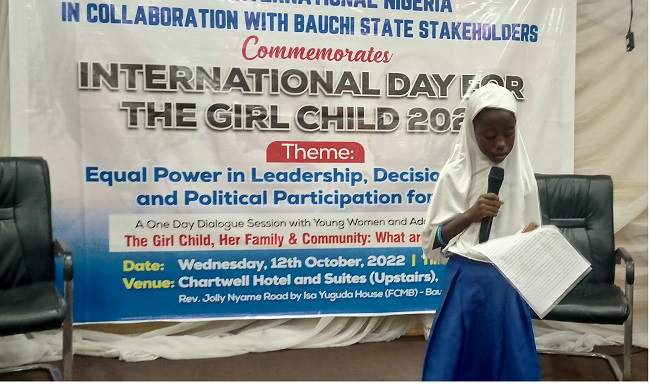It is a known fact that the girl child is facing myriads of challenges ranging from nutrition, and access to basic services such as health, education, water and sanitation.
According to a UNICEF report on the situation of women and children in Nigeria, it was revealed that 46% of Nigeria’s population is under the age of 15, however exclusive breastfeeding stood at 17% over the last decade, and only 18% of children aged 6-24months are fed with the minimum acceptable diet.
The disclosure was contained in a Goodwill Message at the 2022 International Day of the Girl (IDG) Commemoration delivered by Mohammad Nasir Musa, Senior Project Coordinator, Plan International Nigeria in Bauchi on Wednesday.
According to him, “The International Day of the Girl Child started as part of Plan International campaign tagged: “Because I am a Girl”.
The campaign was designed to nurture girls, especially in developing countries to promote their rights and bring them out of poverty.
He also said that following extensive engagement with the Government of Canada by Plan Canada, the government of Canada presented a proposal to the United Nations General Assembly for the International Day of the Girl Child to be passed as a United Nations resolution.
On December 19th 2011, The UN General Assembly successfully adopted the resolution and recognized October 11th as the day of the girl child while the first International Day of the Girl Child was celebrated on October 11th 2012.
The choice of this year’s theme ‘Our Time is Now our rights, our future is well conceived and timely.
Although primary education is officially free and compulsory, only 67% of eligible children take up a place in primary school while in North East, only 41%.
“It may interest you to note that, Plan International launched its state of the girl child report yesterday. The report highlights improvements in the area of nutrition, school enrollment, and health. However, the gap between boys and girls is still wide and keeps increasing as the girl child moves towards adolescence”, he added.
He stressed that challenges such as negative social norms and values, socio-political disorders such as insurgencies, and poverty are a force to reckon with while only a few girls complete their secondary schools, health facilities are designed not with the girl child in mind, and schools lack basic WASH facilities.
Mohammed Nasir Musa added that ” I want to re-echo the words of the Plan Executive Director for West and Central Africa who stated that the 10th anniversary of the International Day of the Girl Child is a good opportunity to assess where we are and ensure strong commitment as we are moving towards the target time for the Sustainable Development Goals 2030″.
He further said that “I want to thank you all for your efforts in keeping the dream of the girl child alive, thanks for coming and I wish you fruitful deliberations”
“In conclusion, Plan International is committed to reaching 100 million girls globally with the necessary skills, competencies and support to be able to lead, learn decide and thrive. Nigeria is contributing 10% of this target”, he concluded.
10 years old Umma Salman Bala Dass from Bluebird Elementary and High School, representing the adolescent girls in Bauchi state said that “Today is International Day for Adolescent Girl Child. As you all know, the Girl Chil is an important part of society, and that is why we are celebrated World Wide. As we mark the 10th International Girl Child Day today, our theme is “Equal Power” in leadership, Decision making and political participation for girls.”
The Primary 5 pupil stated that,” So, who is a girl? A girl is a young female human, usually a child or an adolescent. the girl becomes an adult, she is accurately described as a woman. The girl child is young, sensitive and vulnerable. To this end. I will highlight the challenges girls face in our community”.
According to her, “Firstly, we are challenged by gender inequality. This is a major problem, where the boy has given preference, in terms of Education and other opportunities for self-development especially digital skills, more than the girl child.”
She discloses that “In Bauchi State, recent statistics have shown that we ha I Million out of school children, of which 60% per cent are girls, hawking on streets.”
Ummah Bala added that “Secondly, as a girl child, we have the impediment of menstrual hygiene and reproductive healthcare which is often neglected. Most girls do not have access to sanitary pads due to challenges.”
“More importantly, most girls lack the knowledge of self-care during menstrual and reproductive health, because it is not taught in schools and Parents lack awareness. Amongst other critical needs of the Girl-child such as Child Early/Forced Marriage and Gender Based violence, and poor healthcare systems”, she lamented.
The little girl concluded by saying, “On behalf of the girl child in Bauchi State, I hereby appeal to the state government non-governmental Organizations, our panellists, the media, the audience and other good of Nigeria, to come to the aid of the girl child by providing free and quality education for girls reproductive health education in the school curriculum and providing free sanitary pads.”
ALSO READ FROM NIGERIAN TRIBUNE
- Over 1.411m Nigerians Affected By Flood In 31 States, FCT, 500 Killed ― FG
- EDITORIAL: The Release Of 23 Hostages
- IDG 2022: Nutrition, education, others identify as challenges facing girl child development






